PRAISE FOR JACK: STRAIGHT FROM THE GUT
All CEOs want to emulate Jack Welch. They wont be able to, but theyll come closer if they listen carefully to what he has to say.
Warren Buffett, chairman,
Berkshire Hathaway
True confessions of a CEO... of interest to anyone who really cares about business.
Newsday
Jack Welch gave team leadership new meaning as he took an industrial giant and turned it into an industrial colossus with a heart and a soul and a brain.
Michael D. Eisner, chairman and CEO,
The Walt Disney Company
JACK: STRAIGHT FROM THE GUT is a good place to renew your faith in the success of free enterprise.
USA Today
Riveting... electric... one of the best business books of the year.
BusinessWeek
Jack Welch, the brilliant business magician, has finally disclosed his mystery of management. Now we must accept the generosity of his challenge and try to match or exceed him.
Nobuyuki Idei, chairman and CEO,
Sony Corporation
An American treasure, Jack Welch teaches us how a leader with keen intellect, guts, and honor can impart courage to people around him, weather unexpected storms, inspire performance, and take an organization to greater and greater heights. His formula challenges all of us and any institution striving for excellence.
Bernadine Healy, M.D., former president and CEO,
American Red Cross


Copyright 2001 by John F. Welch, Jr. Foundation
Afterword copyright 2003 by John F. Welch, Jr. Foundation All rights reserved.
My DilemmaAnd How I Resolved It by Jack Welch, reprinted from The Wall Street Journal 2002 Dow Jones & Company, Inc. All rights reserved.
 Warner Business Books are published by Warner Books, Inc.,
Warner Business Books are published by Warner Books, Inc.,
Hachette Book Group, 237 Park Avenue, New York, NY 10017, Visit our Web site at www.HachetteBookGroup.com.
 An AOL Time Warner Company
An AOL Time Warner Company
The "Warner Books" name and logo are trademarks of Hachette Book Group, Inc.
First eBook Edition: September 2001
ISBN: 978-0-7595-0921-4
To the hundreds of
thousands of GE employees
whose ideas and efforts
made this book possible
The authors profits from this book are being donated to charity.
T his may seem a strange way to begin an autobiography. A confession: I hate having to use the first person. Nearly everything Ive done in my life has been accomplished with other people. Yet when you write a book like this, youre forced to use the narrative I when its really the we that counts.
I wanted to mention the names of all the people who took this journey with me. My editors kept beating me up, trying to get the names out. We finally struck a compromise. Thats why the acknowledgments in the back of the book are somewhat long. Please remember that every time you see the word I in these pages, it refers to all those colleagues and friends and some I might have missed.
I spent most of the Saturday morning after Thanksgiving 2000 waiting for the New Guy. That was the secret code for my successor, the future chairman and CEO of General Electric.
On Friday night, the board had unanimously approved Jeff Immelt to succeed me. I called him right away.
I have some good news. Can you and your family come to Florida tomorrow and spend the weekend?
Obviously, he knew what was going on. But we left it at that and went quickly to the arrangements to get him to Florida.
On Saturday morning, I could hardly wait to see him. The long CEO succession process was over. I was already outside when Jeff pulled into my driveway. He had a big smile on his face and was barely out of the car before I had my arms around him, saying exactly what Reg Jones said to me 20 years earlier:
Congratulations, Mr. Chairman!
As we hugged, I felt we were closing the loop.
In that moment, my memories took me straight back to the day when Reg walked into my Fairfield, Connecticut, office and embraced me, in just the same way.
Bear hugs, or any hugs, were not natural gestures for Reg. Yet here he was with a smile on his face and his arms wrapped tightly around me. On that December day in 1980, I was the happiest man in America and certainly the luckiest. If I could pick a job in business, this one would be it. It gave me an unbelievable array of businesses, from aircraft engines and power generators to plastics, medical, and financial services. What GE makes and does touches virtually everyone.
Most important, it is a job thats close to 75 percent about people and 25 percent about other stuff. I worked with some of the smartest, most creative, and competitive people in the worldmany a lot smarter than I was.
When I joined GE in 1960, my horizons were modest. As a 24-year-old junior engineer fresh from a Ph.D. program, I was getting paid $10,500 a year and wanted to make $30,000 by the time I was 30. That was my objective, if I had one. I was pouring everything I had into what I was doing and having a helluva good time doing it. The promotions started coming, enough of them to raise my sights so that by the mid-1970s I began to think that maybe I could run the place one day.
The odds were against me. Many of my peers regarded me as the round peg in a square hole, too different for GE. I was brutally honest and outspoken. I was impatient and, to many, abrasive. My behavior wasnt the norm, especially the frequent parties at local bars to celebrate business victories, large or small.
Fortunately, a lot of people at GE had the guts to like me. Reg Jones was one of them.
On the surface, we could not have been more different. Trim and dignified, he was born in Britain and had the bearing of a statesman. I had grown up just 16 miles north of Boston, in Salem, Massachusetts, the only son of an Irish-American railroad conductor. Reg was reserved and formal. I was earthy, loud, and excitable, with a heavy Boston accent and an awkward stutter. At the time, Reg was the most admired businessman in America, an influential figure in Washington. I was unknown outside of GE, and inexperienced in policy issues.
Still, I always felt a vibration with Reg. He rarely revealed his feelings, never providing even a hint. Yet I had a feeling that he understood me. In some ways, we were kindred spirits. We respected each others differences and shared some important things. We both liked analysis and numbers and did our homework. We both loved GE. He knew it had to change, and he thought I had the passion and the smarts to do it.
Im not sure he knew how much I wanted GE to changebut his support for all I did over 20 years never wavered.
The competition to succeed Reg had been brutal, complicated by heavy politics and big egos, my own included. It was awful. At first, there were seven of us from various parts of the company who were put in the spotlight by the very public contest for Regs job. He hadnt intended it to be the divisive and highly politicized process that it turned out to be.
I made a few mistakes in those years, none fatal. When Reg got the board to approve me as his successor on December 19, 1980, I still wasnt the most obvious choice. Not long after the announcement was made, one of my GE friends walked into the Hi-Ho, the local watering hole near headquarters, and overheard one of the oldtime staffers repeating glumly into a martini, Ill give him two yearsthen its Bellevue.

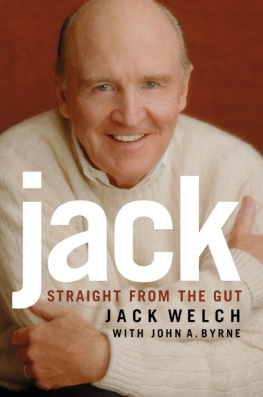
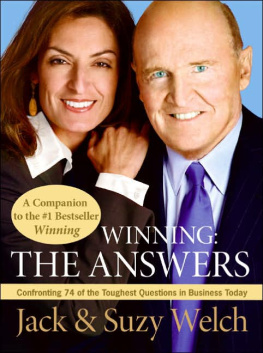
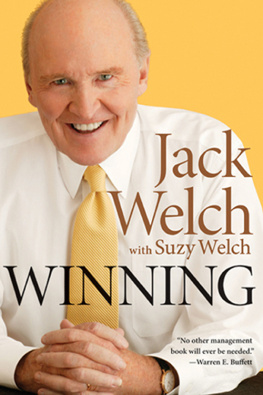


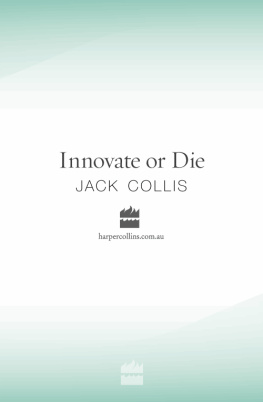
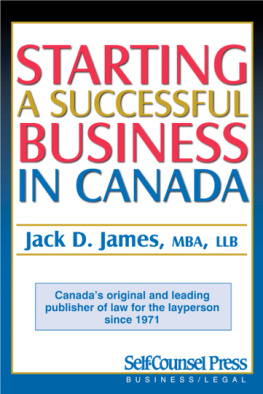
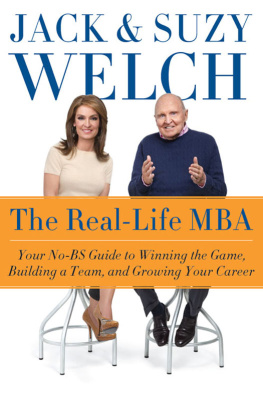
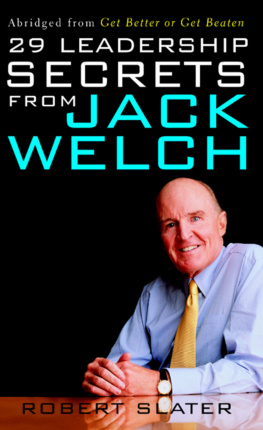
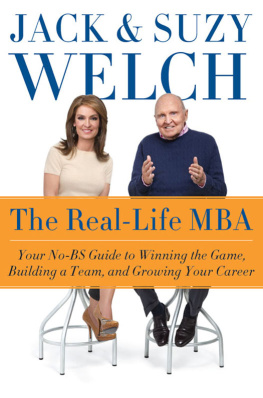
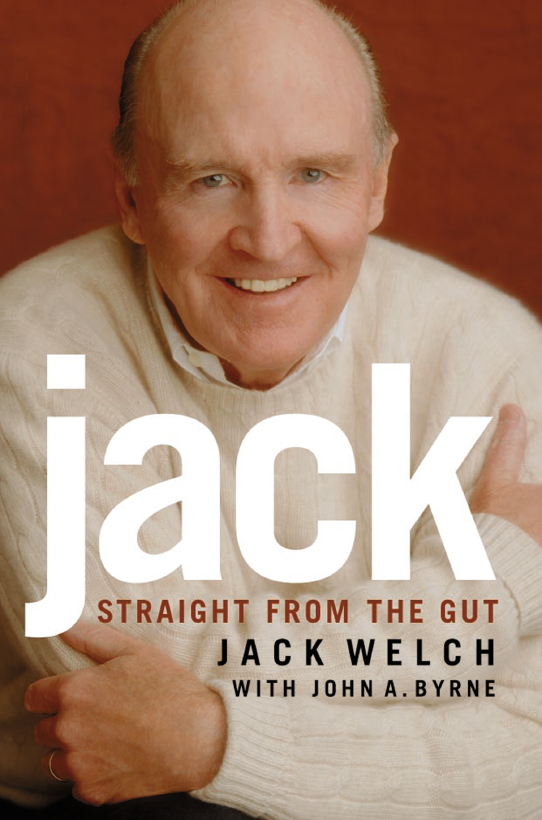


 Warner Business Books are published by Warner Books, Inc.,
Warner Business Books are published by Warner Books, Inc., An AOL Time Warner Company
An AOL Time Warner Company